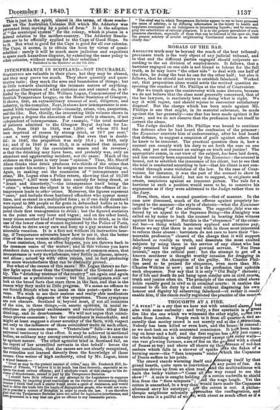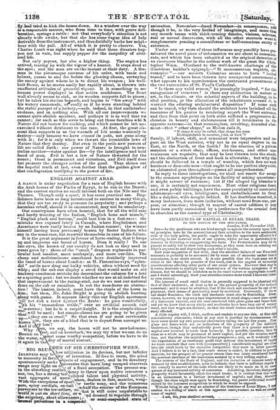THOUGHTS AT A FIRE.
"A FIRE1" is a cry that we hear not with unmixed alarm but
also with some curiosity : and truly, the other night, s e t" a fine spectacle is
fire like the one which we witnessed great miles from London. People rush to it from all quarterA and as- suredly that motley crowd is not merely sad at the d ,esitruction. Nobody has been killed or even hurt, and the houses is insured: so we mob look on with contented conscience. It ha ia been burn- ing an hour and a half, and the first engine has c •ly just come ;
e outer walls_
rid with a cloud tream of red-hot
e the flakes of a
hich the Capaneus musing itself by that any point of fun. An
nd the multitudinous wit e way round to see the a cotton umbrella to shield d the wags laugh. Yet the the whole building is already destroyed except t one vast glowing furnace, a sea of fire on the gro of flames at top; and above all shoots up that embers which falls in a shower of sparks burning snow—the "fiera tempests" under of Dante suffers in his pride.
The crowd stands warming itself and grand hearth, quite open to conviction omnibus drives up from an alien road, hails the bulky visiter—" Come all ' show !" A man is caught holding him from the " fiera tempesta"; cotton is unscathed, in a way tha would have made the Capaneus aforesaid envy his antetype;
f r the cotton is met. A philan- thropic neighbour solemnly •proaches the conflagration, and throws into it a pailful of wa' r, with about as much effect as if a ..liy.hadtried to kick the house down. At a window over the way is :a-respectable matron who from time to time, with grave deli- beration, springs a rattle: not that everybody's attention is not -already-wide awake, but that she has some vague idea of help derivable from the instrument, and thus dutifully backs her neigh- bour with the pail. All of which it is pretty to observe. Yes, Charles Lamb was right when he said that these disasters hap-
• pen not in vain, but supply pepper for the insipidity of ,civil- ire& life. . Nor only pepper, but also a higher thing. The engine has
• arrived, tearing up with the vigour of a hunter. It stops dead at the.spot; and the men are onfthe instant at their duty. A fire- man in the picturesque costume of his order, with tunic and helmet, passes to and fro -before the glowing Lasm, surveying the enemy against whom he is to direct his weapon ; his weir- knit frame, as he moves easily but rapidly about, is thrown into unaffected attitu.des of graceful vigour. It is something to see human power displayed in that active confidence. The front wall already seems to sink, as its wooden supports fall to pieces ; but he takes his station beneath, and begins to "fire away' with his watery cannonade, atecoolly as if he were standing :behind , the stable parapet of a battery,---safe, indeed, in that undisturbed coolness, and in nothing else. With all our improvements we cannot quite abolish accident, and perhaps it is as well -that we cannot; for such as this serve to bring out those faculties -whi Nature did not bestow for nothing, and which cannot be left un- exercised without detriment to the race. At first, the great ele- ment that supports in U8 the warmth of life seems wantonly to destroy—only because we have crossed its path, not gone along with it ; for it is only when we thwart the irresistible laws of Nature that they destroy. But even in, the perils .new powers of life are called forth : one power of Nature is brought toneu- • tralize.another—water a fire—by the intelligence-and bold -hand -of man. Evil is but a law of Nature thwarted for the nonce; Good is permanent and victorious, and Evil itself does but promote the stronger action of the good. Thus shines out . She hopeful truth at last, even farther than-the golden.glow of . that conflagration testifying to the power of fire.



























 Previous page
Previous page